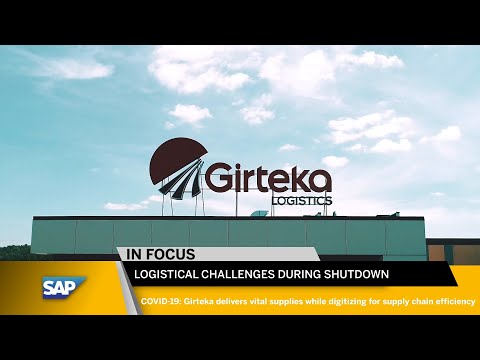These days, there are many thank you messages owed to medical workers and hospital staff around the world in countries severely affected by the Coronavirus (COVID-19).
It is also important to pay tribute to the truck drivers, warehouse workers and logistics staff who continue to deliver food, medical supplies, medicine and other essentials during these difficult times.
With Europe on the brink of recession, with businesses struggling to survive, and healthcare systems stretched to the limit, the need for efficient transportation channels and efficient supply chains is greater than ever.
“During the COVID-19 outbreak, logistics plays a vital role in delivering essentials to isolated communities,” says Martinas Sarabinas, IT Director at Girteka Logistics, one of Europe’s largest trucking companies. “We have 14,000 dedicated truck drivers working tirelessly to keep supply chains running.”


Sarabinas points to the challenge of achieving perfection during a crisis.
Focused on people
“Trucker drivers are in a very difficult situation,” Sarabinas says. “Like most people, they want to stay home safe with their families, but with borders closed across Europe, it is impossible to say when they can return home.”
The company has always prided itself on caring for its employees and providing opportunities to educate and develop people. Jertika Driver Academy not only teaches employees how to drive safely and sustainably, but aims to make every driver an ambassador for the company.
Long term strategy
The trucking industry in Europe is old-fashioned and highly fragmented. More than 90 percent of companies operate fewer than 10 trucks, while only 1 percent operate more than 50 trucks. In order to achieve its ambitious vision of becoming the first European company to have 10,000 trucks of its own, Girteka Logistics has chosen to remain asset-heavy in the world of trucking that operates mostly through third-party service providers.
The company’s 7,400 trucks and 7,800 trailers move 730,000 full truckloads annually. By maintaining control of its assets, a company can significantly reduce complexity for clients. Instead of frantically tracking shipments through countless different service providers and subcontractors, Girteka Logistics maintains complete control of the order.
Another key element in the company’s long-term strategy for success is implementing a fully integrated and comprehensive transportation solution with SAP.
“Our customers expect us to deliver consistent quality at an acceptable price, and to do that, we need real-time visibility across the entire logistics value chain,” Sarabinas explains.
For Girteka Logistics, creating a solid digital foundation is the goal of tomorrow. Digital technology is the foundation of everything the company does, from upskilling people to meeting customer expectations to becoming more sustainable. Having fully integrated and automated systems and processes will relieve the workforce from repetitive tasks and free them to control operations in real time.
Purpose is the new normal
While Girteka is now clearly focused on dealing with the challenges of COVID-19, its long-term focus on digital integration will help ensure the company is well positioned for success post-crisis. Other global challenges including climate change are not going away because of the pandemic.
“Our mission during the crisis is to provide essentials such as food and medical supplies while making health and safety measures for our 18,000 colleagues our top priority,” Sarabinas says. “Our employees have a new sense of purpose because they realize that their work is essential to keeping supply chains running.”
Meanwhile, Sarabinas is following some good advice from Winston Churchill not to waste a good crisis.
To achieve the company’s ambitious business goal and reshape the traditional industry, Girteka Logistics is moving ahead with plans to digitalize its entire business to scale growth.
“We are implementing an end-to-end digital solution to become a truly intelligent organization,” says Sarabinas. “After the crisis, companies will reevaluate their supply chains and business models. We don’t know exactly how companies will operate differently, but we know that we will have the digital foundation to meet whatever expectations customers may have tomorrow.
Listen to the full interview:


Listen to the podcast on Spotify or Anchor.
Follow me on Twitter: @magyarj





